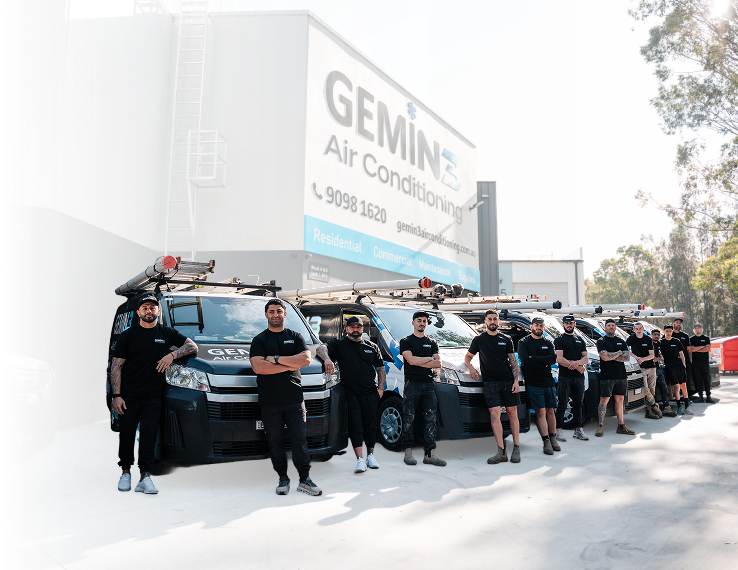At Gemin3 Air Conditioning, we understand the critical role a well-functioning ducted air conditioning system plays in maintaining a comfortable indoor environment, especially during the sweltering summers of Sydney. Ensuring that your air conditioning system is in peak condition is essential not only for comfort but also for energy efficiency and cost-effectiveness. One of the key components that often needs attention is the refrigerant level. An inadequate refrigerant level can compromise the efficiency of your system, leading to increased energy consumption and higher utility bills. Thus, knowing when your ducted air conditioner requires a refrigerant top-up is crucial in preserving the longevity and performance of your system.
In this comprehensive guide, we will delve into the telltale signs that indicate your air conditioning unit might need a refrigerant top-up. From understanding unusual noises and poor cooling performance to recognizing ice buildup on the unit, we will cover a range of indicators that can alert you to potential issues. Furthermore, we will discuss the importance of regular maintenance checks and the benefits of timely refrigerant replenishment. By the end of this article, you will be equipped with the knowledge to identify these warning signs early and take prompt action, ensuring that your ducted air conditioner continues to operate efficiently and effectively. Whether you’re a homeowner or a business owner, this guide will help you maintain a comfortable and energy-efficient indoor climate all year round.
Signs Your Ducted Air Conditioner May Need a Refrigerant Top-Up
As a leading provider of air conditioning solutions in Sydney, Gemin3 Air Conditioning understands the importance of maintaining your ducted air conditioning system. One critical aspect of this maintenance is ensuring that your refrigerant levels are optimal. Insufficient refrigerant can severely impact the efficiency and performance of your system. Here are some key signs that your ducted air conditioner may need a refrigerant top-up.
1. Inadequate Cooling Performance
One of the most noticeable signs that your ducted air conditioner may need a refrigerant top-up is a decline in its cooling performance. If you find that your system is no longer cooling your home as effectively as it used to, this could indicate a low refrigerant level. The refrigerant is responsible for absorbing heat from your indoor air and releasing it outside. Without enough refrigerant, your system cannot efficiently remove heat, resulting in a warmer indoor environment.
2. Increased Energy Bills
A sudden spike in your energy bills can be another indicator of low refrigerant levels. When your air conditioner is low on refrigerant, it has to work harder and run longer cycles to achieve the desired temperature. This increased workload leads to higher energy consumption and, consequently, higher utility bills. Monitoring your energy bills for unusual increases can help you identify this issue early.
3. Ice Build-Up on the Evaporator Coils
Inspecting your system for ice build-up on the evaporator coils is another way to determine if a refrigerant top-up is needed. Low refrigerant levels cause the evaporator coils to become too cold, which can lead to moisture in the air freezing on the coils. This ice build-up can further impede the cooling process and even damage your system if left unaddressed. Regular visual inspections can help you catch this problem before it worsens.
4. Hissing or Bubbling Noises
Unusual sounds coming from your air conditioning system, such as hissing or bubbling noises, could indicate a refrigerant leak. These sounds are often caused by refrigerant escaping from the system, which reduces the refrigerant level over time. If you hear these noises, it’s essential to contact a professional technician to assess your system and determine if a refrigerant top-up is necessary.
5. Longer Cooling Cycles
If your ducted air conditioner is taking longer to reach the set temperature, this may be a sign of low refrigerant levels. With insufficient refrigerant, the system cannot efficiently transfer heat, resulting in prolonged cooling cycles. This not only affects your comfort but also puts additional strain on your air conditioning system, potentially leading to more significant issues down the line.
6. Vents Blowing Warm Air
Another clear sign of low refrigerant levels is when the air blowing from your vents is not as cool as it should be. If your system is blowing warm or lukewarm air, it may be due to inadequate refrigerant levels preventing the system from effectively cooling the air. This symptom should prompt a thorough inspection and potential refrigerant top-up.
7. Routine Maintenance and Inspection
While experiencing any of the above symptoms can indicate a need for a refrigerant top-up, routine maintenance is the best way to ensure your system is operating with optimal refrigerant levels. Regular inspections by a qualified technician can identify and address refrigerant issues before they affect your system’s performance, saving you time and money in the long run.
At Gemin3 Air Conditioning, we recommend keeping an eye on these signs to ensure your ducted air conditioning system continues to operate efficiently. If you suspect your system may need a refrigerant top-up, do not hesitate to contact us for professional advice and service.
Causes of Low Refrigerant Levels
Understanding the causes of low refrigerant levels in your ducted air conditioning system is crucial for maintaining its efficiency and longevity. Here, we delve into the primary reasons your system might be experiencing a refrigerant shortfall.
1. Refrigerant Leaks
One of the most common causes of low refrigerant levels is leakage. These leaks can occur due to several factors:
- Wear and Tear: Over time, the components of an air conditioning system can degrade. This is particularly true for the copper coils, which can develop small cracks or holes. These imperfections allow refrigerant to escape slowly but steadily.
- Corrosion: In environments like Sydney, where humidity and pollution are prevalent, corrosion can occur on the metal parts of your air conditioning system. This corrosion can lead to holes in the coils, resulting in refrigerant leaks.
- Physical Damage: Accidental impacts, such as those caused by renovations or maintenance activities, can damage refrigerant lines and lead to leaks. It’s important to ensure that any work around your air conditioning system is conducted with care.
2. Poor Installation
Improper installation can be a significant factor in refrigerant loss. If your ducted air conditioner was not installed correctly, it might have insufficient refrigerant from the outset, or the system might have vulnerabilities that lead to leaks over time:
- Incorrect Refrigerant Charge: An incorrect refrigerant charge during installation can lead to suboptimal performance right from the start. If the initial charge is too low, your system will struggle to cool effectively and may develop issues as a result.
- Faulty Connections: Poorly connected joints or improperly sealed fittings can lead to immediate or gradual refrigerant loss. Ensuring that all connections are secure and properly sealed is essential during installation.
3. Manufacturing Defects
Although less common, manufacturing defects can also be a cause of refrigerant loss:
- Defective Components: Occasionally, components such as coils or compressors may have manufacturing defects that lead to refrigerant leaks. These defects might not be apparent immediately but can cause issues over time.
- Ineffective Seals: Sometimes, seals or gaskets used in the manufacturing process may not perform as intended, leading to slow refrigerant leaks.
4. Aging System
As with any appliance, aging can affect your ducted air conditioning system:
- Degradation of Materials: Over the years, the materials used in your air conditioning system can degrade, leading to leaks. This is particularly true for older systems that may not have been designed to withstand the environmental conditions they are exposed to today.
- Outdated Technology: Older systems may not be as robust as newer models, and their design might make them more susceptible to leaks and inefficiencies.
5. Environmental Factors
External factors can also contribute to the loss of refrigerant:
- Vibrations and Movements: Vibrations from nearby machinery or even natural ground movements can loosen connections over time, leading to leaks.
- Temperature Fluctuations: Extreme temperature changes can cause the metal components of your system to expand and contract, potentially leading to small gaps where refrigerant can escape.
By identifying these common causes, you can take preventative measures to ensure your ducted air conditioning system remains efficient and effective. Regular maintenance and inspections are key to catching these issues early and preventing refrigerant loss.
What to Do if You Suspect Low Refrigerant
If you suspect that your ducted air conditioning system is low on refrigerant, addressing the issue promptly is crucial to maintaining efficiency and preventing further damage. Here is a detailed guide on what steps to take if you suspect low refrigerant in your system.
1. Identify the Symptoms
Before taking any action, ensure that the symptoms you are experiencing are indeed indicative of low refrigerant levels. Key signs include:
- Poor Cooling Performance: If your air conditioner is not cooling as effectively as it used to, it may be due to insufficient refrigerant.
- Higher Energy Bills: A system low on refrigerant needs to work harder, resulting in increased energy consumption and higher bills.
- Ice Formation on Evaporator Coils: Ice buildup on the coils is a classic sign of low refrigerant, causing reduced airflow and cooling capacity.
- Hissing or Bubbling Noises: These sounds can indicate a refrigerant leak, which leads to low levels.
- Longer Cooling Cycles: If your air conditioner is taking longer to reach the desired temperature, it may be a sign of low refrigerant levels.
2. Conduct a Preliminary Inspection
Once you’ve identified the symptoms, conduct a preliminary inspection to confirm your suspicions:
- Check the Air Filter: Ensure that your air filter is clean. A clogged filter can restrict airflow, mimicking the effects of low refrigerant.
- Inspect the Outdoor Unit: Look for any visible signs of damage or ice buildup on the outdoor unit, which could indicate a leak.
- Listen for Unusual Noises: Pay attention to any hissing or bubbling sounds near the indoor or outdoor units, as these can suggest a refrigerant leak.
3. Contact a Professional Technician
If your preliminary inspection supports your suspicion of low refrigerant, the next step is to contact a professional HVAC technician:
- Expert Diagnosis: A qualified technician can accurately diagnose the issue using specialized equipment to measure refrigerant levels.
- Leak Detection: Professionals can perform leak detection tests to find and repair any leaks, preventing future refrigerant loss.
- Proper Top-Up: Technicians will ensure the correct type and amount of refrigerant is added to your system, as using the wrong type can damage the system.
- System Inspection: While on-site, a technician can inspect your entire system to ensure there are no other underlying issues affecting performance.
4. Consider Long-Term Solutions
Once the immediate issue is resolved, consider implementing long-term solutions to prevent recurrence:
- Regular Maintenance: Schedule regular maintenance checks to ensure your system remains in optimal condition and to catch any potential issues early.
- Upgrade Options: If your system is older, it might be time to consider upgrading to a more efficient model with modern refrigerants that are better for the environment.
- Refrigerant Replacement: If your system uses an outdated refrigerant type, such as R-22, consider replacing it with a newer, more environmentally friendly option.
5. Monitor the System Post-Service
After the refrigerant top-up, continue to monitor your air conditioning system to ensure it operates efficiently:
- Observe Performance: Keep an eye on the cooling performance and listen for any unusual noises.
- Check Energy Consumption: Review your energy bills to confirm that they have returned to normal levels following the service.
- Routine Inspections: Periodically inspect the system for any signs of leaks or ice formation and address issues promptly.
Taking these steps will help ensure your ducted air conditioning system remains efficient and effective, providing the comfort you expect throughout the year.
The Benefits of Keeping Your Refrigerant Levels Optimal
A well-functioning ducted air conditioning system is crucial for maintaining comfort and energy efficiency in both residential and commercial spaces. One of the key components that ensure your air conditioner operates at its best is the refrigerant. Proper refrigerant levels not only enhance the performance of your system but also provide several long-term benefits. Here, we delve into the advantages of maintaining optimal refrigerant levels in your ducted air conditioning system.
Enhanced Cooling Efficiency
Consistent Temperature Regulation
Maintaining optimal refrigerant levels ensures that your ducted air conditioner operates efficiently. The refrigerant is responsible for absorbing heat from indoor air and releasing it outside, thus regulating the temperature within your premises. With the correct amount of refrigerant, your system can effectively maintain a consistent and comfortable temperature, preventing hot and cold spots.
Faster Cooling Times
When refrigerant levels are optimal, your air conditioning system can cool your space more quickly. This efficiency not only ensures immediate comfort but also reduces the workload on your system, potentially extending its lifespan.
Energy Cost Savings
Reduced Energy Consumption
An air conditioning system with the right amount of refrigerant operates more efficiently, which means it uses less energy to achieve the desired cooling effect. This reduction in energy consumption translates to lower utility bills, providing significant cost savings over time.
Decreased Wear and Tear
Optimal refrigerant levels reduce the strain on the compressor and other components of your air conditioning system. By minimizing wear and tear, you can avoid costly repairs and replacements, further lowering your overall operational costs.
Improved Environmental Impact
Lower Carbon Footprint
Efficient air conditioning systems consume less energy, which in turn reduces the carbon footprint of your home or business. By maintaining the proper refrigerant levels, you contribute to environmental conservation efforts and promote sustainable energy use.
Prevention of Refrigerant Leaks
Regular maintenance and refrigerant top-ups help in early detection and prevention of leaks, which can release harmful substances into the atmosphere. Keeping refrigerant levels optimal minimizes the risk of leaks and their associated environmental impact.
Prolonged System Lifespan
Enhanced Component Longevity
Proper refrigerant levels ensure that all components of your ducted air conditioning system are working under optimal conditions. This balance reduces the likelihood of component failure and prolongs the operational lifespan of the system as a whole.
Fewer Maintenance Interventions
With optimal refrigerant levels, your air conditioning system experiences fewer operational issues, leading to reduced need for maintenance interventions. This reliability not only saves you time and money but also ensures uninterrupted comfort in your space.
Optimal Air Quality
Effective Humidity Control
Refrigerant plays a key role in dehumidifying the air as it cools your space. By maintaining optimal levels, your system can effectively manage indoor humidity, preventing problems such as mold growth, allergens, and dust mites, which can affect air quality and health.
Consistent Airflow
Correct refrigerant levels ensure that your air conditioner provides consistent and adequate airflow throughout your ducted system. This consistency enhances indoor air quality and ensures that all areas of your home or business are evenly cooled.
In conclusion, keeping your refrigerant levels optimal is essential for maximizing the performance, efficiency, and lifespan of your ducted air conditioning system. By doing so, you not only enjoy immediate comfort and cost savings but also contribute to a healthier environment and improved indoor air quality.
Conclusion
Maintaining optimal performance of your Gemin3 ducted air conditioning system is crucial for ensuring comfort and efficiency in your business environment. Regular monitoring for signs that indicate a refrigerant top-up is necessary can prevent costly repairs and maintain the longevity of your system. By being attentive to common indicators such as reduced cooling efficiency, unusual noises, and visible leaks, you can proactively address potential issues. Additionally, it is essential to schedule regular professional maintenance and inspections to accurately assess the refrigerant levels and overall health of your system. Understanding and implementing these practices will not only enhance the comfort of your business premises but also contribute to energy savings and environmental responsibility. Remember, a well-maintained air conditioning system is a key asset to your business operations and customer satisfaction.






